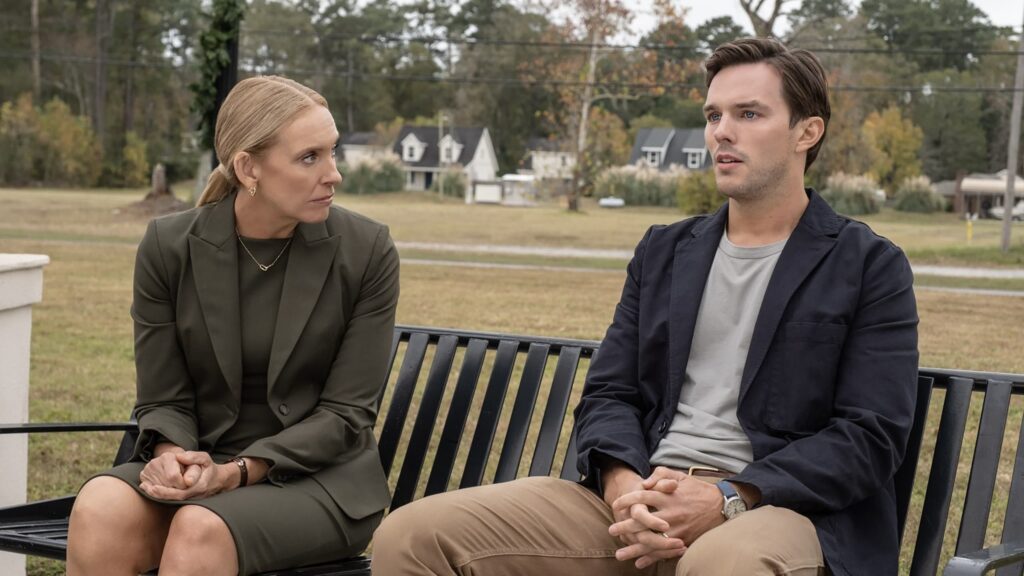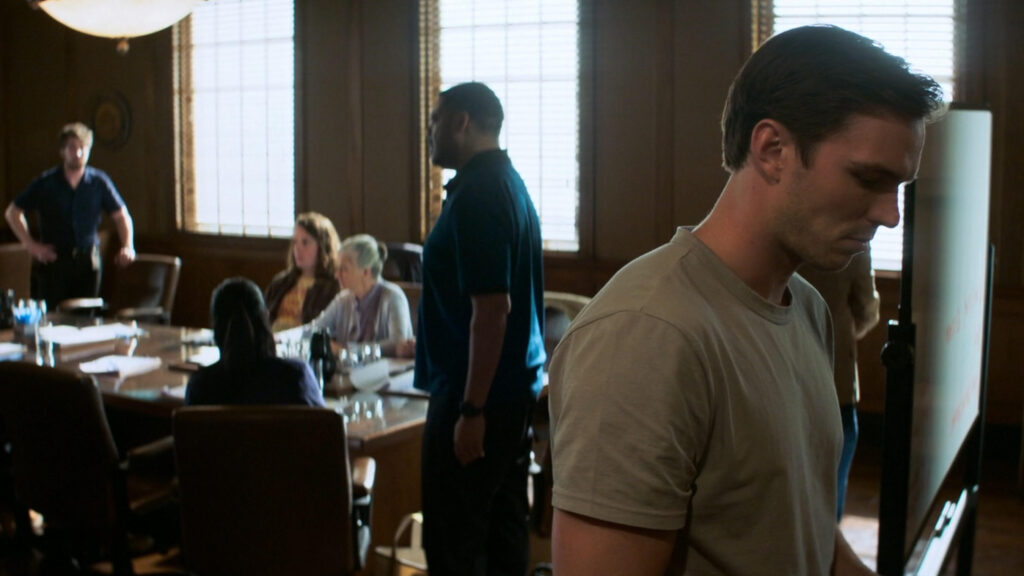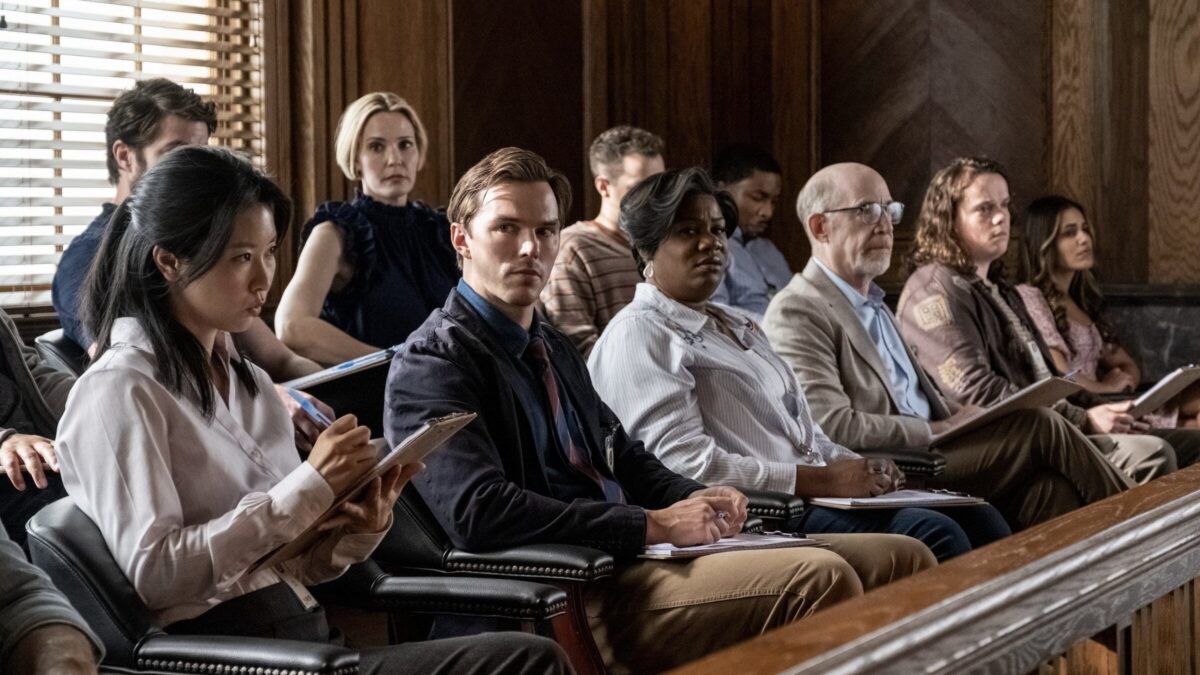Anatomy of a Hoult
The idea behind Clint Eastwood’s latest film is fantastic. It’s just a phenomenal “what if”: What if, in 12 Angry Men, Henry Fonda was the one actually responsible for the death at the center of the trial he’s on the jury for? It requires acceptance of a few XL-sized coincidences, but if you can ride with him past those first ten minutes of the film, you’re set. Eastwood plays the film as equal parts suspenseful thriller and ethical examination, both to excellent effect.
Justin Kemp (Nicholas Hoult) is a kind, normal man whose wife Allison (Zoey Deutsch) is nine months pregnant with their first child when he’s issued a jury summons. As soon as he hears the opening statements on the case, his blood runs cold. A man (Gabriel Basso) is accused of murdering his girlfriend (Francesca Eastwood) after an argument at a bar as they walked home that rainy night. We see in flashback Justin at that same bar that same night, hopping in his car and driving home. At the very spot where cops found the body, he hit something — a deer, he thought, but now he believes the worst. Whether the flashback we’re seeing is objectively complete or a subjective memory of Justin’s is left up to the viewer, though Eastwood’s unadorned style certainly suggests truth. The vision of that night sharpens throughout the film, not shifting so much as crystallizing in certain important details, similar to the most recent Eastwood film I saw before this, Sully.

Eastwood’s famously unfiltered directorial style works wonders here. The actors all give raw performances, as if unrehearsed and spontaneous, but almost never bad. The real professionals — Deutsch, Hoult, Toni Colette, Chris Messina, an underused JK Simmons — knock it out of the park with thought-out visions of characters that deepen the screenplay. The smaller names deliver something more quirky. Comedian Cedric Yarbrough is terrific as a combative juror, but a little unhinged. He’s a blend of Lee J. Cobb and Ed Begley but driven by self-righteousness rather than personal grievance or racism.
I bring up 12 Angry Men repeatedly in this review not simply because it’s the easiest point of comparison in all of cinema for films focused on jury deliberations. Eastwood and screenwriter Jonathan A. Abrams are clearly inspired by and reacting to that seminal film. (Heck, the film directly quotes it a couple of times.) Abrams seems to agree with me that the two main flaws in the original are that it displays dubious juror conduct of stepping outside the presented facts of the case (humorously and promptly addressed in Juror #2) and that it offers an incomplete look at justice. Of course, the human condition dictates that justice will never be complete — we are too multitudinous and diverse as people and as a society for any pat definition of such a broad concept to fit everywhere. But Juror #2 acknowledges that what we think of as justice is often more complicated than a distinction between right and wrong. Rather, it is a balancing act between different slippery gray areas. A prosecutor uses tunnel vision on guilt because that’s what’s asked of her by the people who elected her. A jury refracts a case through its own biases and experiences, swayed as much by rhetoric and self-constructed narratives as it is by facts — and yet, that ability to see defendants and witnesses as human beings with personal stories is essential for their duty. One man who is otherwise decent might be guilty of a single, horrible, accidental act; another man who is otherwise violent might be innocent of the action that would put him behind bars. These details of the story serve as stand-ins for concepts in a way that’s messy and incomplete itself, but evocative.
Parts of the story are blocky and not completely thought through. Eastwood leaves a crucial inflection point of the jury deliberation off-screen in ellipsis to such jarring effect that I wondered if my stream had accidentally skipped ahead ten minutes. The details of the case itself are underdeveloped — no one in the film ever acknowledges that, even separate from Justin’s conundrum, a lot of the evidence presented is circumstantial. And I wonder if the final scene is a bit too ambivalent and open-ended to really resonate, tossing the film’s themes in the air one last time, then ending in a figurative freeze frame before the audience or any character in the film has a chance to react.

And if I were to pick at the story a bit more, I’d point out a lot of the contrivances, as well as the repeatedly idiotic decisions by Justin. The thriller aspect of the story slackens in the closing twenty minutes as character actions become a bit less logical and more direct lenses of the big themes of the story. In other words, if I were Justin and acting in my self-interest, I would do almost everything differently from what he does, particularly as his jury duty reaches its conclusion.
But overall, I am just really smitten with Juror #2. Despite its imagination-capturing premise, it’s old-fashioned and free of gimmicks, like a 1990s prestige film that you used to catch on HBO on a Sunday afternoon and describe as “solid.” I mean that as a compliment; these types of thoughtful, direct, adult-focused pictures are an endangered species (or at minimum a “near threatened” species, to apply the IUCN scale).
And the craft in the film is quite excellent. I remain baffled how Eastwood’s directorial style that feels so hands-off on the surface is so consistent and tough to replicate by other filmmakers, so taut and immersive. I’m most of all impressed by the acting, with Hoult in particular absolutely sensational. He nails the high-wire act of being deeply sympathetic and expressive without soft-pedaling his mistakes. If you have any doubt that he’s the real deal and can carry a film by himself (and such doubt would be misplaced if you’ve been paying attention), Juror #2 absolves it. He’s a frontrunner for my pick for lead acting performance of the year when I put together the 2024 B.A.D.S.
Eastwood is an old geezer, and for about thirty years now his movies have been obsessed with retrospection and relitigating the blurry lines of heroism and villainy. Over and over, critics have labeled his movies a “swan song.” At age 94, anytime he release a film, it might be the last time. While Eastwood might not have made his name on courtroom thrillers, Juror #2 would be a worthy, deeply thoughtful farewell to a long and industrious career.
Is It Good?
Very Good (6/8)
Awards, Honors, & Rankings
- The B.A.D.S. (2024) - Best Actor (Nicholas Hoult) (Nominee)
- Top 10 Movies of 2024 - Next Ten (#11-20)
Dan is the founder and head critic of The Goods. Follow Dan on Letterboxd. Join the Discord for updates and discussion.


8 replies on “Juror #2 (2024)”
“The idea behind Clint Eastwood’s latest film is fantastic. It’s just a phenomenal “what if”: What if, in 12 Angry Men, Henry Fonda was the one actually responsible for the death at the center of the trial he’s on the jury for?”
OK, that’s a sweet hook, which I somehow hadn’t realized about the movie. (Feels like it has a marketing budget of $2, which may be closer to the truth than otherwise.) I’ll have to jump on this, and return soon!
There’s been much hullabaloo about WB burying the film for no obvious reason. Perhaps the accountants and tax lawyers suggested it. Apparently they’re trying to brand it as a “Max original” now.
The short version is I liked the movie okay, but noticeably less than you (for instance, I kind of think Hoult is doing fine with what he’s decided to do, but what he’s decided to do is really, really narrow).
As for Warners, I’ll express some annoyance that as I catch up with 2010s/2020s Eastwood I’m having to actually pay to rent most of them, thanks to either some sort of specific policy or Max’s irritating general policy of rotating movies on and off. (Noticed it especially with the Nightmares, which, as a B-tier but still marquee film series for Warners, is a bizarre thing to be rotating on and off. It’d be like Disney+ giving you the Indiana Jones movies but only half the time.) Guess it helps physical media which is… gross, given the mercenary ends, but possibly not bad in outcome.
I spent a minute or two trying to come up with a way to execute a hung-ter jury pun to no avail.
That’s baffling behavior on Max. One silver lining of Disney owning 60% of all IP is they tend to make it readily available and easy to find, at least moreso than some of the other streamers I use. Of course that could backfire with a single boardroom whim.
I mean, as far as their 21st century Disney-the-Juggernaut stuff goes, they ain’t too bad at it (I’ll leave it to connoisseurs of obscure Disney semi-ephemera to say if that’s entirely true, but as far as feature films go, the big irritating omission is The Lone Ranger, which at least isn’t on Disney+ for ascertainable reasons).
I worry IMMENSELY about the future of the 20th Century Fox catalog.
I didn’t mention in my review but I think one reason I latched onto this pretty strongly is because I have a recurring nightmare that I did something awful to someone I don’t know and am haunted by both the guilt and the fear I’ll get caught, so, uh, basically exactly this premise. (The act itself is inconsistent in my dreams, but it has been drunk driving.) So parts of this were genuinely frightening to me.
Dan’s scariest horror movie: I Know What You Did Last Summer.
My nightmares aren’t so conceptual, they mostly revolve around dying in pits full of bugs. (Hence Hunter’s scariest horror movie: Temple of Doom.)
But in that case, I’d be tight with 1997 JLH so I’d call it a wash. Also last year’s Infinity Pool, but then I could rat out my clone. Oops, spoiler.